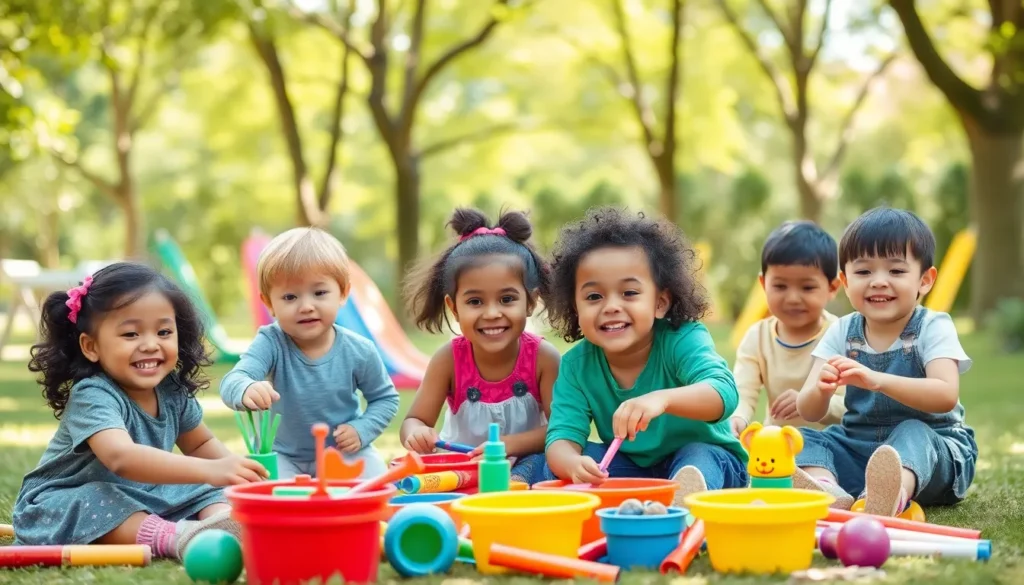Table of Contents
TogglePreschool play isn’t just about kids having fun; it’s the secret sauce for their development. Imagine a world where tiny hands build towering block castles while little minds explore the wonders of imagination. That’s the magic of playtime! It’s where friendships blossom and creativity knows no bounds, all while sneaking in essential learning.
In this vibrant realm of preschool play, children aren’t just passing the time—they’re mastering skills that’ll serve them for a lifetime. From problem-solving to teamwork, every game and giggle lays the groundwork for future success. So, if you think play is just play, think again! It’s the ultimate power-up for little learners, and it’s time to dive into the delightful chaos that shapes their early years.
The Importance of Preschool Play
Preschool play serves as a crucial component of children’s development. Engaging in play provides opportunities for growth across various domains.
Cognitive Development Benefits
Cognitive development thrives during preschool play. Children explore concepts such as number recognition and spatial awareness while playing games. During creative activities, they practice language skills and enhance problem-solving abilities. Engaging in pretend play allows them to understand different perspectives, which boosts empathy. Encouraging exploration leads to curiosity, reinforcing a lifelong love for learning.
Emotional and Social Skills
Emotional and social skills develop significantly through play. Interactions with peers promote cooperation and negotiation, which are vital for future relationships. Children learn to express emotions openly while engaging in group activities. Through taking turns and sharing toys, they practice patience and empathy. These experiences help them manage feelings of frustration and joy. Overall, preschool play cultivates essential skills for navigating social environments effectively.
Types of Play in Preschool

Different types of play in preschool serve unique purposes and foster various skills. Understanding these types helps educators and parents support children’s development effectively.
Free Play
Free play allows children to choose their activities organically. They explore their interests freely, which nurtures creativity and imagination. During free play, children engage with toys, art supplies, or nature, making choices that enhance decision-making skills. This type of play encourages self-directed learning and independence. Additionally, through unstructured interactions, they develop social skills like sharing and collaborating. In essence, free play cultivates a sense of agency and fosters an inherent curiosity about the world.
Structured Play
Structured play involves guided activities led by an adult, combining learning and fun. Participants engage in specific tasks designed to achieve learning outcomes. This type of play may include games that focus on teamwork, problem-solving, and following rules. Structured play introduces children to routines, enhancing their ability to focus and adhere to guidelines. Teachers often use this approach to target essential skills, such as language and math through interactive games. Overall, structured play supports the acquisition of knowledge while providing an engaging environment for skill development.
Role of Educators in Preschool Play
Educators play an essential role in preschool play, guiding children’s development through thoughtful engagement and support.
Facilitating Learning Through Play
Educators facilitate learning by integrating educational goals into play activities. They design activities that promote critical thinking and problem-solving while allowing children to explore at their own pace. For instance, when children participate in group games, they enhance collaboration and social skills. Observing interactions helps educators identify individual needs and tailor support accordingly. This adaptability ensures that learning remains relevant and engaging, making play an effective educational tool.
Creating a Play-Friendly Environment
Creating a play-friendly environment is crucial for fostering creativity and exploration. Educators organize tools and materials that encourage imaginative play and facilitate hands-on learning experiences. Spaces should be inviting, with a variety of resources available to appeal to diverse interests. Safety and accessibility are also priorities; this allows all children to explore and experiment confidently. By maintaining a stimulating environment, educators help children thrive, paving the way for enriched learning experiences.
Challenges in Implementing Preschool Play
Implementing preschool play faces several significant challenges, affecting its effectiveness in child development.
Limited Resources
Limited resources in preschools hinder the ability to provide diverse play experiences. Many educators work with tight budgets, restricting access to quality toys and materials. Insufficient training for staff can also impact their capacity to facilitate engaging play experiences. Class sizes may be large, making individual attention difficult. These limitations impede children’s exploration and enjoyment during play, reducing opportunities for learning.
Parental Perceptions
Parental perceptions significantly influence the implementation of play in preschool settings. Some parents prioritize academic outcomes over play, viewing it as less valuable. Misunderstandings about the role of play can lead to pressure on educators for more structured learning activities. Many parents may not recognize the importance of play for cognitive, social, and emotional development. Communicating the benefits of play to parents can challenge these perceptions and foster a more supportive environment for effective preschool play.
Preschool play is an essential building block for children’s growth and development. It offers opportunities for creativity social interaction and emotional growth. By engaging in both free and structured play children not only learn critical skills but also develop a love for learning that lasts a lifetime.
Educators play a pivotal role in creating enriching play experiences that cater to children’s diverse needs. Overcoming challenges such as limited resources and misconceptions about play is crucial for fostering an environment where children can thrive.
Recognizing the invaluable role of play in early education can lead to more supportive practices that prioritize children’s holistic development, ensuring they are well-prepared for future challenges.







